Introduction
Finding the right therapist for a child with autism spectrum disorder (ASD) is a crucial step in ensuring their well-being and development. In this article, we will explore the importance of selecting an autism therapist who is not only accessible but also proficient in evidence-based treatments. We will discuss the qualifications and therapy methods to look for in a therapist, as well as the impact of individualized and independence-focused therapy on autistic children.
Additionally, we will provide guidance on researching local therapists, checking credentials and specializations, reading reviews and asking for referrals, evaluating therapist experience with autism, considering insurance and cost, scheduling consultations, assessing communication styles, evaluating treatment approaches, ensuring accessibility and accommodations, and following up and adjusting as needed. By following these steps and staying informed about the latest treatments and therapeutic approaches, parents can navigate the complexities of autism care and provide their child with the best possible support for their development.
Understanding the Importance of Finding an Autism Therapist
Selecting an autism therapist who is not only geographically accessible but also proficient in evidence-based treatments can significantly influence the life of an individual on the autism spectrum. Cognitive Behavior Therapy (CBT), an evidence-based therapy, is widely recognized for its effectiveness in improving mental health conditions. It has been adapted into various forms, such as Mindfulness-Based Cognitive Therapy and Trauma-Focused CBT, to cater to different needs.
The recent rise in telehealth services has expanded the options available, allowing individuals to choose from a wider pool of professionals. Despite this increase, finding the right therapist requires understanding their qualifications and therapy methods. Board-Certified Behavior Analysts, for instance, bring a wealth of experience and expertise to the table, ensuring high-quality, coordinated care.
Real-world success stories, like those shared by Kara, a pediatric occupational therapist, highlight the positive outcomes of individualized and independence-focused therapy for autistic children. These therapies not only address the immediate challenges but also aim to equip children with the skills necessary for a more self-reliant future. The ultimate goal is to foster an environment that supports the mental health and overall well-being of children with disabilities, in line with the vision of making society equitable for all, as emphasized by the late Dr. David (Dan) R. Offord.
In conclusion, understanding and embracing autism through acceptance, inclusion, and education are vital. As research psychologist Dr. Jac den Houting suggests, the way family and friends respond to an autism diagnosis can shape the individual's future, making support and affirmation of their autistic identity essential components of their development.
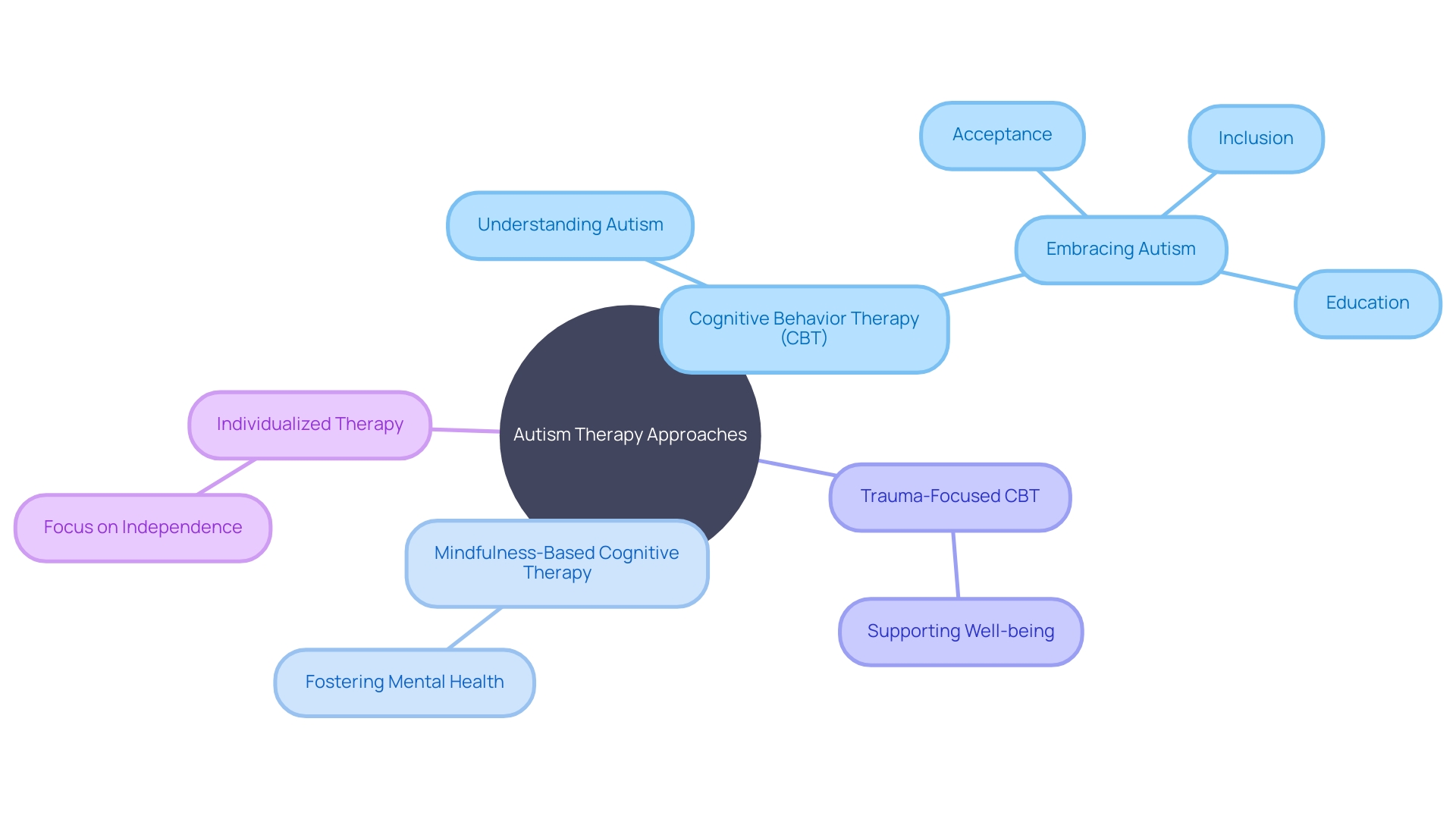
Step 1: Research Local Therapists
As you initiate the process of finding a therapist for your child with ASD, it's essential to target professionals who not just specialize in autism spectrum disorder but also possess the experience needed to work with your child's specific age and developmental stage. Kara, a pediatric occupational therapist from Florida, underscores the importance of therapy tailored to individual capabilities, emphasizing the positive outcomes she has witnessed with tailored independence therapy. To connect with such therapists, consider exploring local resources and clinics, keeping an eye out for those who practice evidence-based therapies like Cognitive Behavioral Therapy (CBT) and Dialectical Behavior Therapy (DBT), which have shown effectiveness across various mental health conditions, including those common in autistic individuals.
Furthermore, with the rise of telehealth services, your options for finding specialized care have expanded, allowing for a more comprehensive approach to support your child's growth and development.
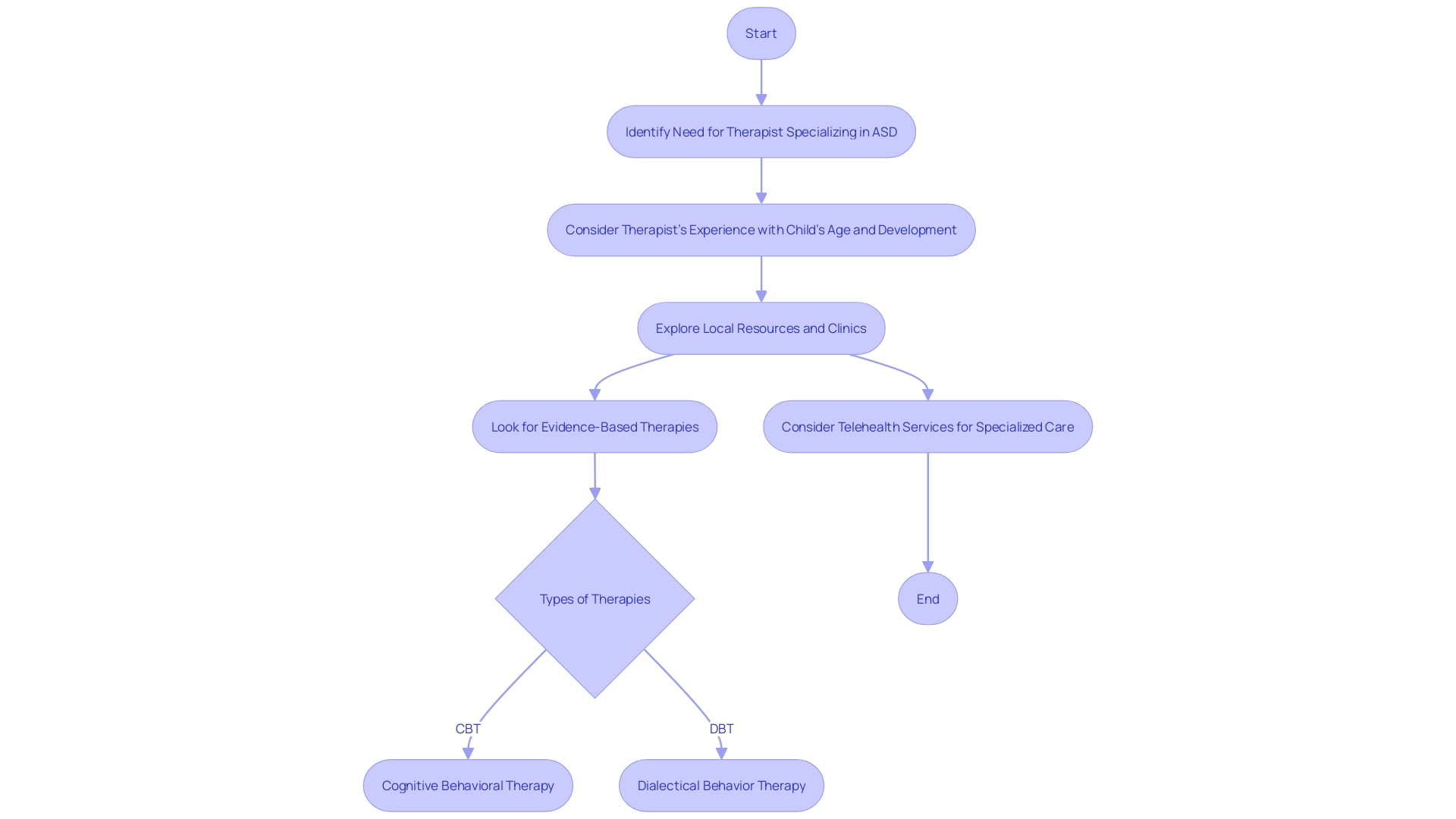
Step 2: Check Credentials and Specializations
When seeking therapy for adults with autism, it's critical to select professionals who not only hold the necessary credentials, such as being a Board Certified Behavior Analyst (BCBA), but also possess a deep understanding of the unique challenges and strengths of autistic individuals. Therapists should be equipped to handle a variety of conditions that commonly accompany autism, such as anxiety and depression, without solely relying on specialized referrals which may be difficult to access.
It is essential for therapists to have a blend of certified expertise and the capacity for empathy and connection, building trust with their patients. Those with additional experience in technology solutions that coordinate care and streamline processes can offer a higher level of service, ensuring that the diverse needs of autistic adults are met in a comprehensive and respectful manner. With the prevalence of autism diagnoses potentially as high as 1 in 36 individuals, the demand for knowledgeable and compassionate care providers is more critical than ever.
The field of autism therapy is evolving, with a shift towards evidence-based practices and a more nuanced understanding of what constitutes meaningful and lasting change for patients. As researchers and clinicians continue to refine their approaches, it's important for therapists to stay informed and adapt their methods to offer the best support possible to their autistic patients, regardless of the stage in life they are navigating.
Step 3: Read Reviews and Ask for Referrals
Navigating the journey of adult autism diagnosis can be complex. While the neurodivergent community embraces self-diagnosis, recognizing the challenges within the medical testing model that often yield inconclusive results, the decision to pursue a formal diagnosis is personal. It can affirm one's identity and provide a clearer pathway to tailored support.
For some, an official diagnosis validates their experiences, aiding in self-advocacy and acceptance from others. The Interagency Autism Coordinating Committee (IACC), a federal advisory group, actively works to advance autism research and services, reflecting diverse perspectives, including those of autistic adults. Autistica's research indicates that nearly 1 in 70 people in the UK is autistic, yet there remains a disparity in employment rates and earnings for autistic individuals.
Initiatives that foster awareness, reduce stigma, and leverage the productivity of autistic employees are crucial. Engaging with professionals, such as Board-Certified Behavior Analysts, who develop technology solutions for coordinated care, can also be instrumental in achieving high-quality support and services for the autistic community. As you consider the best path forward, remember to draw insights from the experiences and recommendations of others to guide your decision-making process.
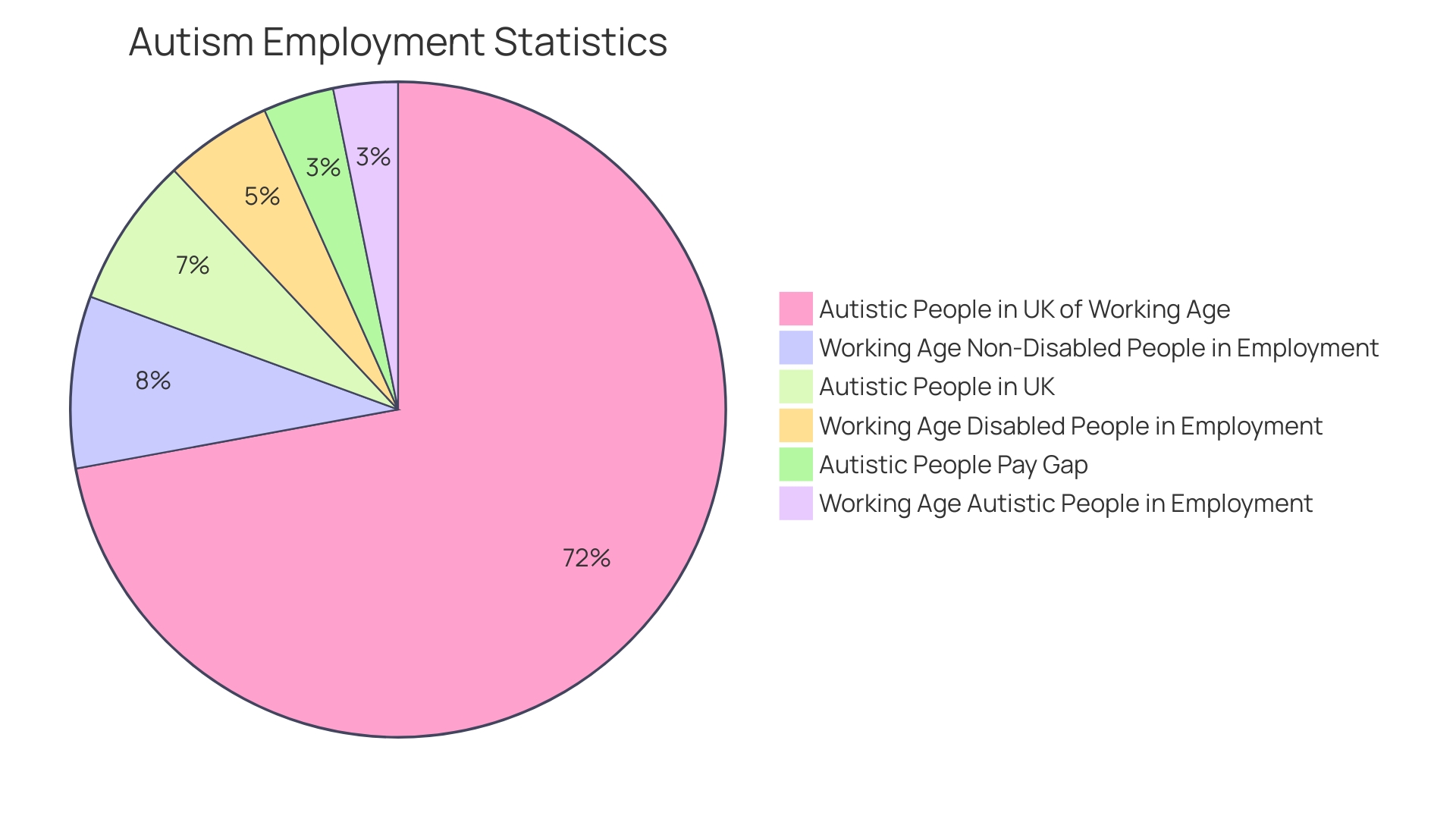
Step 4: Evaluate Therapist Experience with Autism
When selecting a therapist for autistic individuals, it's paramount to delve into their expertise with the autism spectrum. Engage the therapist in a conversation about their past experiences with people on the spectrum, and ask them to share stories of triumphs and progress they've witnessed. Kara, a pediatric occupational therapist, emphasizes the importance of tailored approaches, like her successes with independence therapy for autistic children, illustrating that a therapist's adaptability and innovative strategies can lead to remarkable outcomes.
The current shift to evidence-based practices in autism research, as seen in the adoption of randomized controlled trials over quasi-experimental studies, underscores the need for therapists to be informed and up-to-date with the most effective interventions. Furthermore, a New York state-licensed and Board-Certified Behavior Analyst highlights the significance of over a decade's worth of clinical insights and the development of technology solutions to provide high-quality, coordinated care. This expertise is crucial to navigate the complexities of autism and to foster a supportive therapeutic environment that acknowledges the unique abilities and challenges of autistic individuals.
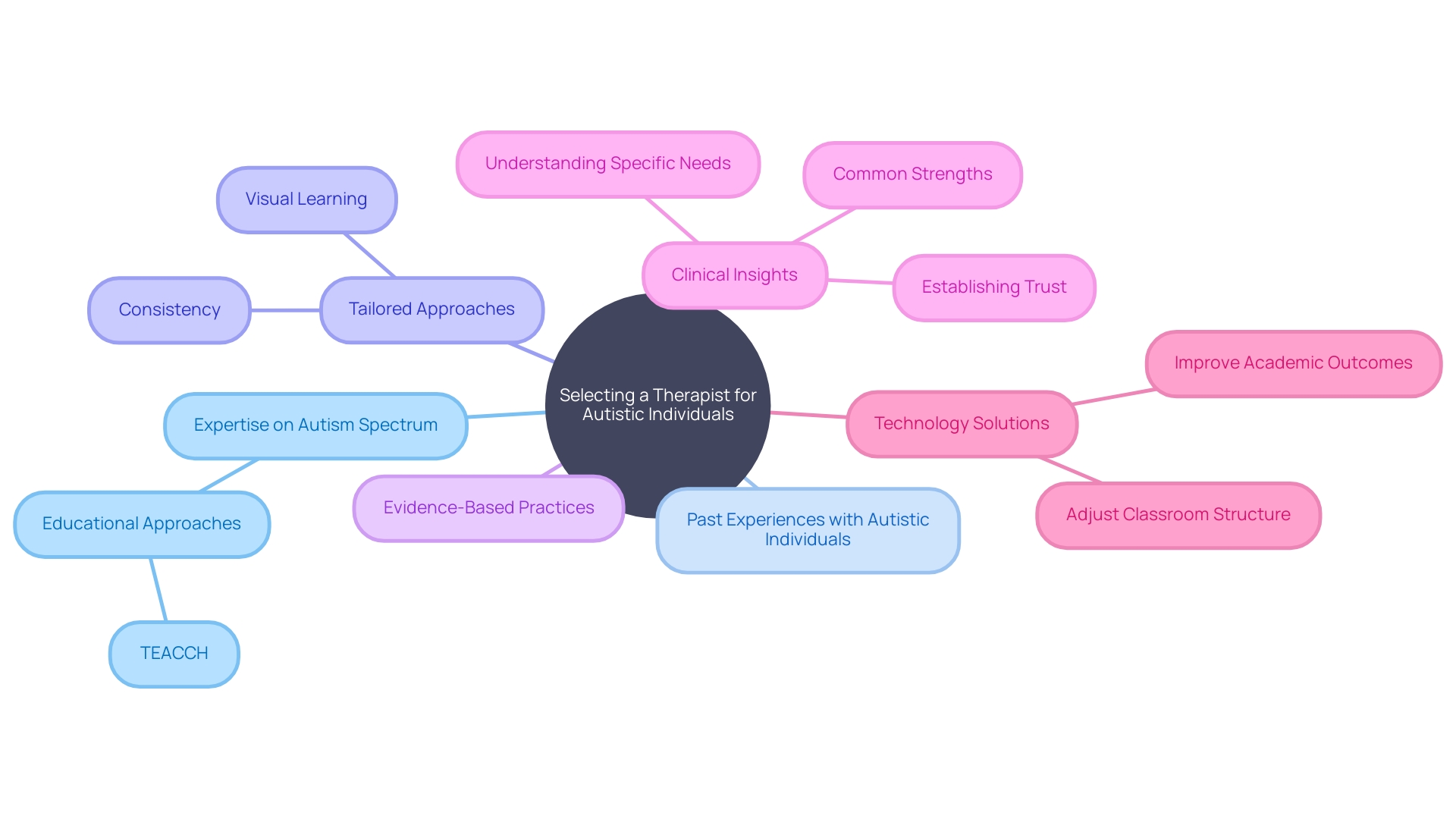
Step 5: Consider Insurance and Cost
Navigating the complexities of insurance coverage is crucial when seeking therapy for autism and related mental health services. In Pennsylvania, the Mental Health Parity and Addiction Equity Act mandates equal coverage for mental health and substance use disorders as compared to medical/surgical services. However, it's important to understand that while this act ensures parity, it does not guarantee that all insurance plans cover these services.
The Affordable Care Act does require certain plans to offer these benefits, and Pennsylvania's Act 106 stipulates minimum coverage for alcohol and substance use disorder treatment. Therefore, the initial step is to determine the specifics of your health insurance policy.
Recent reports highlight a troubling gap: only 30.7% of individuals with a behavioral health condition and commercial insurance received specialty care in 2021. The discrepancy between coverage and actual access to care is a significant concern, often exacerbated by 'ghost networks' and out-of-network costs. Ensuring that your therapist accepts your insurance and discussing fees transparently is essential to receiving the care you need without financial strain.
Professionals in the field, like Board-Certified Behavior Analysts with extensive clinical experience, emphasize the importance of coordinated care and the utilization of technology solutions by providers and health plans. This approach aims to offer high-quality care that is streamlined and efficient for both patients and therapists. By being informed and proactive about your insurance coverage, you are taking a decisive step towards accessing the necessary support within your budgetary constraints.

Step 6: Schedule Consultations
Arranging face-to-face consultations with autism therapists is a critical step in the journey towards finding the right support for adults with autism. These meetings are not just about asking questions; they offer a rare chance to gauge the therapist's approach and determine if they align with the individual's unique needs. A New York state-licensed and Board-Certified Behavior Analyst, with a wealth of clinical experience and a focus on high-quality, coordinated care, emphasizes the importance of technology in streamlining such processes for both providers and patients.
With autism affecting approximately 2.2% of adults in the United States, it's crucial to recognize the varied challenges they may encounter daily, from social interaction difficulties to sensory sensitivities. Businesses are increasingly receiving training to become more accessible to autistic individuals, further highlighting the need for personalized and understanding care options. As caregivers, understanding and staying informed about the latest treatments and therapeutic approaches is essential, underscoring the importance of consultations with knowledgeable professionals who can navigate the complexities of autism care.
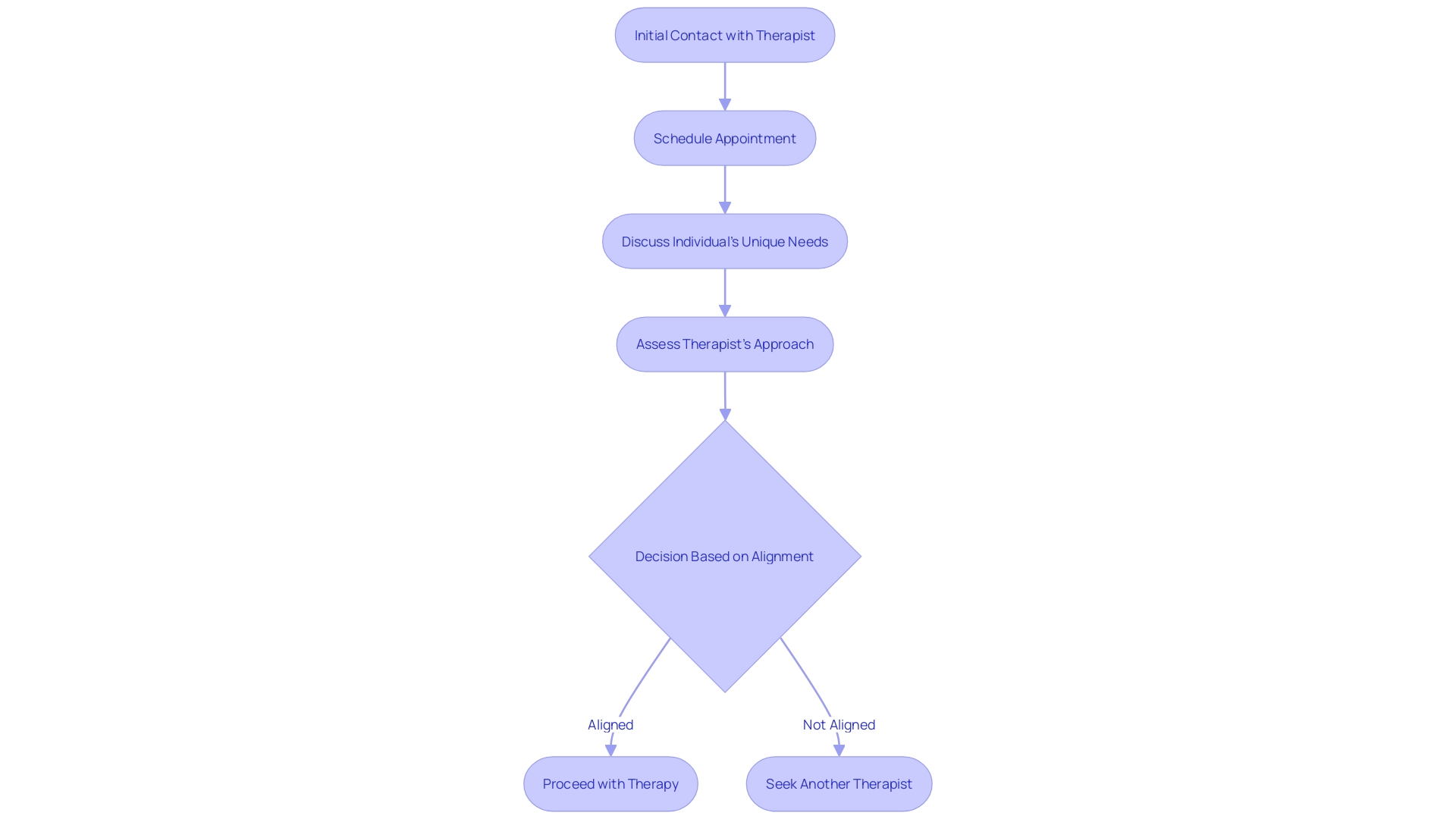
Step 7: Assess Communication Styles
When selecting a therapist for a child with autism spectrum disorder (ASD), it's crucial to consider their communication style and their capacity to establish a positive rapport with your child. Children with ASD have unique needs, and a therapist who can create a supportive and comforting atmosphere will greatly enhance your child's ability to thrive in therapy. As the prevalence of ASD continues to rise, with current research indicating that 1 in 36 children is diagnosed with the condition, it becomes increasingly important to ensure that therapeutic interventions are tailored to the individual.
A therapist's clinical knowledge can make a profound difference in coordinating care that is not only high quality but also empathetic and patient-centered, especially considering the unique social communication challenges associated with autism. By prioritizing these qualities in a therapist, parents can feel confident that they are providing their child with the best possible support for their development.
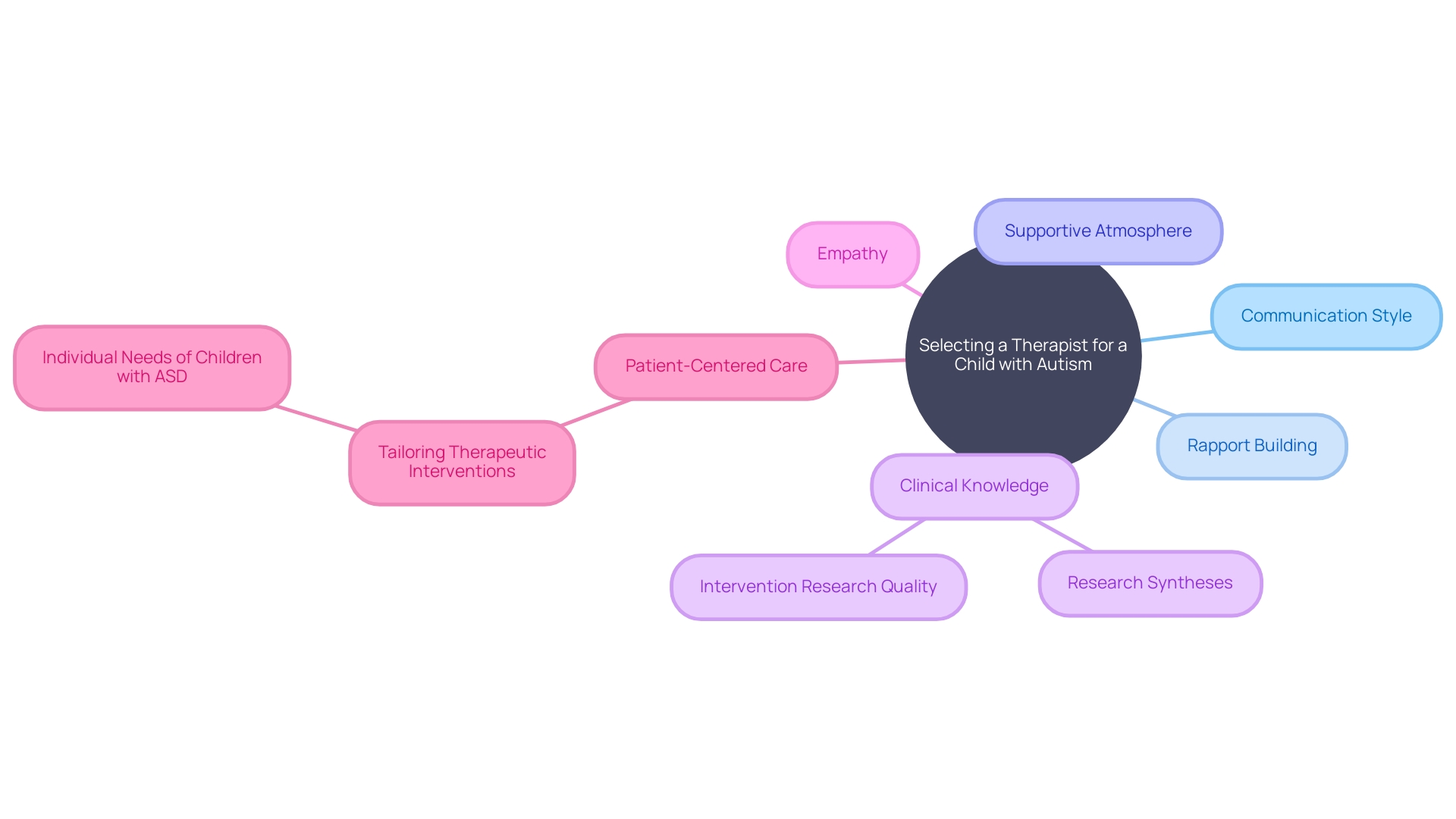
Step 8: Evaluate Treatment Approaches
When seeking a therapist for autism intervention, it's crucial to engage with professionals who utilize evidence-based strategies, as these have been scientifically validated for their effectiveness in improving mental health conditions. Cognitive Behavior Therapy (CBT), for instance, is a widely recognized evidence-based approach, along with its adaptations such as Mindfulness-Based Cognitive Therapy and Trauma-Focused CBT. It is vital that the chosen therapy aligns with the needs of the individual and leverages up-to-date research studies, including randomized-controlled trials, which have become the gold standard in autism research, replacing quasi-experimental studies.
As you navigate this process, it's important to be aware that many intervention studies have been conducted with design flaws that can obscure their true impact, including their effectiveness and any potential harm. Therefore, a critical evaluation of a therapist's treatment approaches must be thorough, taking into account factors such as the study design, the scope of expected change, and the extent to which the interventions incorporate feedback from key community members, including those with autism.
In an increasingly digital age, the rise of telehealth services has expanded access to qualified therapists, although this does mean that you'll need to be discerning in understanding their credentials and the therapies they offer. Remember, the goal is to find a therapist whose methods are not only established by research but are also perceived as respectful and effective by the autism community itself.
Step 9: Ensure Accessibility and Accommodations
When selecting an autism therapist, it's crucial to consider both the accessibility of their services and the accommodations they can provide. Accessibility goes beyond mere physical location; it encompasses the ease with which your child can integrate into the therapeutic environment. An ideal setting would be one that allows your child to engage without undue stress or distraction, akin to creating a quiet nook in a bustling open-plan office.
Accommodations, on the other hand, are personalized adjustments made to cater to your child's specific needs, ensuring that therapy is not just a possibility, but a comfortable and beneficial experience for them.
According to Autistica, approximately 1 in 70 people in the UK is autistic. It is paramount that services are designed with the understanding that autistic individuals often face significant challenges in traditional workspaces and therapy settings. As stated by a seasoned New York state-licensed and Board-Certified Behavior Analyst, technology solutions can play a pivotal role in coordinating care that adheres to best practices, ensuring high-quality support tailored to each individual's needs.
With only about 3 in 10 autistic adults employed, it's clear that more inclusive and accommodating practices are needed to bridge the gap and harness the productivity of this underrepresented group in the workforce.
Step 10: Follow Up and Adjust as Needed
Selecting a qualified autism therapist is just one step in the journey toward supporting your child's development. It is equally crucial to collaborate closely with the therapist to establish SMART goals—specific, measurable, achievable, relevant, and time-bound objectives for the therapy sessions. As the therapy progresses, maintain an active role by periodically reviewing these goals with the therapist, making sure they remain aligned with your child's evolving needs.
As noted by experts, open and continual communication is key to evaluating the effectiveness of the therapeutic approaches. This includes being aware of any new research findings or treatments that may benefit your child, and understanding the intricacies of any prescribed medications—their benefits, risks, and the behavioral changes they may bring.
The commitment to a fair and supportive environment for children with disabilities, as emphasized by the late Dr. David (Dan) R. Offord, is foundational to their mental health and overall well-being. This entails providing resources for caregivers to nurture their child's growth and reduce stress. Sharing stories, like those from pediatric occupational therapist Kara, can inspire parents to foster independence in their children, which has shown remarkable benefits in various cases.
It's essential to remain informed and adaptable, leveraging the expertise of medical professionals and the most current evidence-based practices in autism care. By doing so, you ensure a therapeutic journey that not only meets your child's immediate needs but also builds a foundation for their long-term development and participation in all aspects of life.

Conclusion
In conclusion, finding the right therapist for a child with autism spectrum disorder (ASD) is crucial. Look for a therapist who is accessible and proficient in evidence-based treatments like Cognitive Behavior Therapy (CBT). Individualized and independence-focused therapy can have positive outcomes for autistic children, equipping them with essential skills.
Research therapists' qualifications and therapy methods, and consider reviews and referrals. Evaluate therapists' experience with autism and their adaptability to tailored approaches. Consider insurance coverage and cost, and schedule consultations to gauge therapists' approach.
Assess therapists' communication styles and their ability to establish rapport with your child. Look for evidence-based treatment approaches that are informed by up-to-date research. Ensure accessibility and accommodations in the therapeutic environment.
Follow up and adjust therapy goals to support your child's development. Collaborate with the therapist and maintain open communication to evaluate effectiveness.
Stay informed, adaptable, and leverage the expertise of medical professionals to provide the best support for your child's development. Foster a fair and supportive environment for children with disabilities, prioritizing their mental health and overall well-being.




